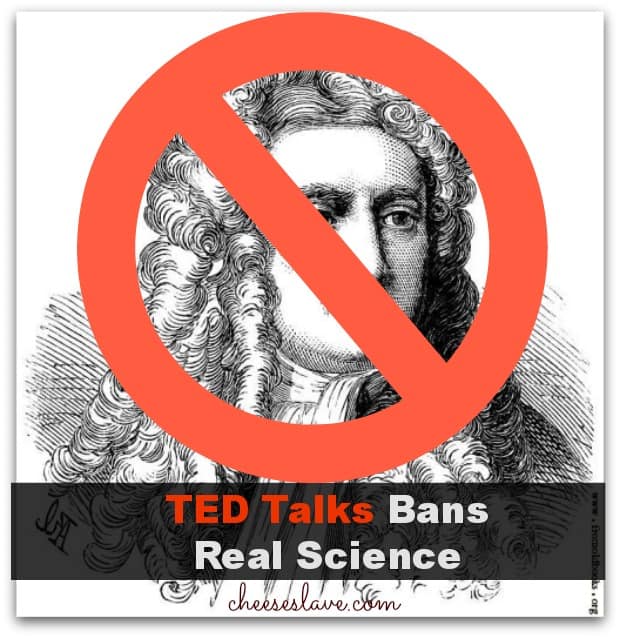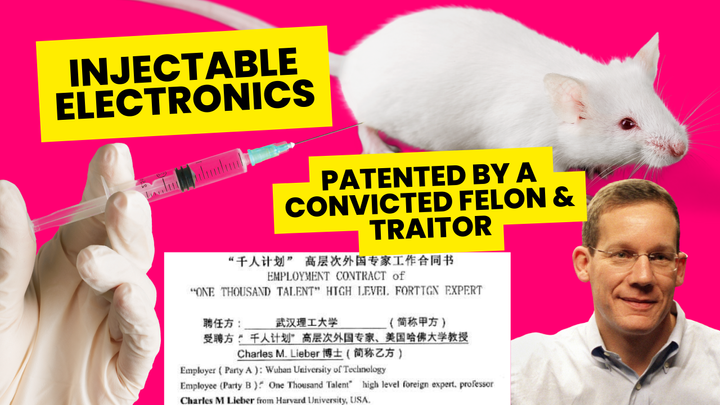TED Talks Bans Real Science
If you have not heard the news, TED Talks recently denied the allegation that they have a relationship with Monsanto as well as the claim that they are banning all talks regarding GMO food.

“Unthinking respect for authority is the greatest enemy of truth.” — Albert Einstein
If you have not heard the news, TED Talks recently denied the allegation that they have a relationship with Monsanto as well as the claim that they are banning all talks regarding GMO food.
Implicit in the denial was a strong suggestion that local organizers of TEDx Talks ban any talks regarding GMOs as well as any subjects they regard as “pseudoscience."
If TED Talks curators took their own advice, they would ban Copernicus, Newton, Darwin, Galileo and Einstein. So much for “ideas worth spreading”.

What Are the “Marks of Good Science” According to TED?
Unoriginal ideas and conformity with the status quo.
According to Lara Stein, TEDx Director, the marks of “good science” are:
- It makes claims that can be tested and verified
- It has been published in a peer reviewed journal (but beware… there are some dodgy journals out there that seem credible, but aren’t)
- It is based on theories that are discussed and argued for by many experts in the field
- It is backed up by experiments that have generated enough data to convince other experts of its legitimacy
- Its proponents are secure enough to accept areas of doubt and need for further investigation
- It does not fly in the face of the broad existing body of scientific knowledge
- The proposed speaker works for a university and/or has a phD or other bona fide high level scientific qualification
Some pretty flawed logic here… Let’s break down what’s wrong with this argument, shall we?
The History of Gravity
Before we take apart their argument, we need a little background.
Let’s talk about gravity. You know about gravity, right? No, not the new George Clooney movie.
Gravity, the thing that makes us all stay on the ground and not float around in the stratosphere. Let’s take a little walk through the history of gravity…
In the Middle Ages, humans adhered to the geocentric astronomical model. They believed that the Earth was the center of the Universe, and that the Sun and the planets revolved around it. This was the status quo.
The Roman Catholic Church, essentially the biggest authority on the planet at the time, was on board with this line of thinking. The geocentric model held man (humans) at the center of the universe. Since they believed God created man, this made perfect sense.
Nicolaus Copernicus (1473-1543) rejected the geocentric model when he came up with his hypothesis for the the heliocentric (Sun-centered) model . In his book, On the Revolutions of Heavenly Spheres (published the year he died, 1543), he proposed that the Earth and all the other planets revolve around the Sun (Helios).
Copernicus argued that the earth rotates daily on its axis and revolves yearly around the sun, and that the other planets revolve around the sun. In doing so, he took man (humans) out of the center of the universe.
Let’s just say this was not an idea god-fearing Catholics in the 16th century took kindly to.
Along came Galileo Galilei (1564 – 1642). He had a little thing called a telescope, a brand new invention at the time, which he used to actually observe the heavens. This was something that had never been done before. Galileo’s discoveries (the phases of Venus and Jupiter’s moons) supported Copernicus’ Heliocentric model.
According to Wikipedia, Galileo:
…met with opposition from astronomers, who doubted heliocentrism due to the absence of an observed stellar parallax. The matter was investigated by the Roman Inquisition in 1615, and they concluded that it could be supported as only a possibility, not an established fact. Source
Oh, yeah, Galileo’s little theory was so soundly rejected by the ruling class (the Inquisition), that he was formally charged and forced to recant his views and is condemned to house arrest for the rest of his life.
Hmm… I wonder if they would have let Galileo speak at the TED Talks? But before I go there, let’s find out what happened next in the History of Gravity…
And no, we’re not up to George Clooney yet — stay with me!
A couple of other guys came along — Johannes Kepler and Tycho Brahe… and they moved things forward. But it wasn’t until Sir Isaac Newton entered the scene that things anything really changed.

Keep in mind, Newton wasn’t born until 1642 — the year Galileo died, after being publicly humiliated and spending decades under house arrest.
Sir Isaac Newton’s book, [easyazon-link asin=”1607962403″ locale=”us”]The Principia: Mathematical Principles of Natural Philosophy[/easyazon-link], was not published until 1687, and basically proved once and for all everything his predecessors, Copernicus, Galileo, Kepler and Brahe were saying.
So it was basically 100 years from Galileo’s assertion to Newton… so yeah, not a lot of agreement there. Very slow going, in fact.
Bottom line: Newton and his predecessors did not inspire and influence the scientific revolution by staying safe within the parameters of the old worldview (Aristotelian theory, which is what the old geocentric model was based on).
And Would They Have Been Allowed to Speak at TED Talks?
According to the new rules proposed by TED Talks, probably not.
If you read my little History of Gravity, I think you’ll agree that science is not a static dogma. Those who ask questions or come up with hypotheses that are contrary to convention or the prevailing understanding are not heretics who should be banned.
They may be wrong. But that doesn’t make their ideas dangerous or unworthy of consideration.
There is consensus in real science, and university education is usually necessary, especially in our era of specialization. However, that doesn’t mean that anyone who has a different idea, contrary to what the Bill and Melinda Gates Foundation, for instance, promotes, is wrong.
It doesn’t require a Ph.D to make the claim that GMOs might be harmful and it might not be a great idea to offer ourselves and our children as participants in a harmful and destructive science experiment. Doing so does not automatically make you a “fringe” lunatic. In fact, to censor that person and label his or her work as “pseudoscience” for lack of a position at a university, or for lack of peer review in a journal (but only one that is acceptable to you) is fallacious logic. In other words, it is unscientific.
*cough* Two words: ad hominem.
Many scientists who are against GMOs, or who have the audacity to believe that food is medicine, do teach in universities, do conduct studies that are published in peer-reviewed journals, and do have consensus among others who conduct similar studies and investigate related ideas.
But even if they didn’t teach in universities or publish articles in peer-reviewed journals, that does not mean their arguments would be invalid.
The writers reaffirm their bias for unoriginal ideas, which in a truly scientific marketplace of ideas would be welcome and not feared or censored, even extending a value judgment of “overconfident” fringe experts. Again, logically and scientifically, an individual’s confidence or lack thereof has nothing to do with the worthiness of their ideas. This is the tactic of attempting to ridicule and marginalize one’s opponent rather than address the content of his or her argument. It works well, unfortunately, but is definitely not a scientific way of addressing matters pertaining to science.
But to the point — what is this “pseudoscience” they speak of, and what are the “red flag topics” TED organizers are so afraid of?
What are the “Marks of Bad Science” According to TED?
Pseudoscience, according to TED:
- Has failed to convince many mainstream scientists of its truth
- Is not based on experiments that can be reproduced by others
- Contains experimental flaws or is based on data that does not convincingly corroborate the experimenter’s theoretical claims
- Comes from overconfident fringe experts
- Uses over-simplified interpretations of legitimate studies and may combine with imprecise, spiritual or new age vocabulary, to form new, completely untested theories.
- Speaks dismissively of mainstream science
- Includes some of the red flags listed in the two sections below
Red flag topics:
These are not “banned” topics by any means — but they are topics that tend to attract pseudo-scientists. If your speaker proposes a topic like this, use extra scrutiny. An expanding, depressing list follows:
Food science, including:
- GMO food and anti-GMO foodists (EDIT 10/3/13: “Foodist” was the wrong word here and we recognize it was offensive to many.)
- Food as medicine, especially to treat a specific condition: Autism and ADHD, especially causes of and cures for autism
- Because of the sad history of hoaxes with deadly consequences in the field of autism research, really look into the background of any autism-related talk. If you hear anything that sounds remotely like, “Vaccines are related to autism,” — RUN AWAY. Another non-legitimate argument: “We don’t know what works, so we have to try everything.” Pretty much all the time, this argument is designed to cause guilt in suffering parents so they’ll spend money on unproven treatments.
So GMO food is presumed to be safe, vaccines are safe, food is not medicine, and, unbelievably, experimentation is not credible science.
Ideas worth spreading? Only if the idea is something everyone can agree on and approve.
Real science? Hypotheses that break out of the status quo? Nope, not allowed.
What Do You Think?
Share your comments below.



Comments ()